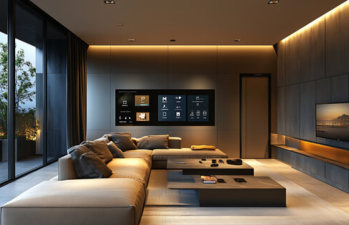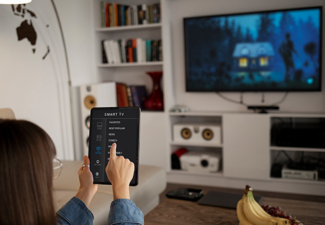With the rapid development of artificial intelligence (AI) technology, more and more families are beginning to introduce smart technology into their daily lives. AI is not only a technological tool, but also a powerful tool to improve the quality of life. From home management to entertainment, AI is changing our lifestyle in all aspects, making family life more intelligent and convenient.
With the rapid development of artificial intelligence (AI) technology, more and more families are beginning to introduce smart technology into their daily lives. AI is not only a technological tool, but also a powerful tool to improve the quality of life. From home management to entertainment, AI is changing our lifestyle in all aspects, making family life more intelligent and convenient.
Whole-house smart ecosystem
The future smart home will realize the construction of a whole-house smart ecosystem, and every device and system in the home will be interconnected to form an organic whole. From smart door locks, lighting systems, temperature control systems to security systems, all devices can be uniformly managed and regulated through a central control system.

Deep integration of artificial intelligence
Artificial intelligence technology will be more deeply integrated into smart homes. Through machine learning and data analysis, smart home systems can learn users' living habits and preferences, automatically adjust the working status of equipment, and provide more personalized services. For example, smart refrigerators can recommend recipes based on users' eating habits, and smart washing machines can choose the most suitable washing mode based on the material of clothes.
Natural language processing and voice interaction
With the advancement of natural language processing technology, future smart homes will pay more attention to the experience of voice interaction. Users can control the devices in their homes through voice commands, realizing the real "moving mouth without moving hands". In addition, smart home systems can also understand users' natural language instructions and provide more humane services.
Combination of augmented reality and virtual reality
Augmented reality (AR) and virtual reality (VR) technologies will bring a new interactive experience to smart homes. Users can preview the effect of furniture placement at home through AR technology, or experience remote travel, online shopping and other activities through VR technology. The application of these technologies will greatly enrich the functions and application scenarios of smart homes.
Energy management and sustainable development
Smart home systems will pay more attention to energy management and environmental protection, and achieve optimal configuration and efficient utilization of energy through smart grids and distributed energy systems. For example, smart solar panels can automatically adjust their working status according to weather changes, and smart temperature control systems can automatically adjust indoor temperature according to the temperature difference between indoor and outdoor.

Health management system
Future smart homes will pay more attention to the health of residents, monitor residents' vital signs such as heart rate, sleep quality, etc. through various sensors, and synchronize data to the health management platform. Smart home systems can provide health advice based on monitoring results, and even automatically contact medical services in emergency situations.
Security and privacy protection
With the popularization of smart home devices, data security and privacy protection have become the focus of users. The future smart home system will adopt more advanced encryption technology and security protocols to ensure the security of user data. At the same time, the system will provide more privacy protection options, allowing users to independently control the sharing and use of personal information.
Seamless integration across devices and services
The future smart home will achieve seamless integration across devices and services. Whether it is a mobile phone, tablet, smart watch or other smart device, users can control the devices in their home anytime and anywhere. At the same time, the smart home system will be integrated with more online services and applications to provide richer functions and services.
Personalized customization and modular design
Smart home will provide more personalized customization services, and users can choose different devices and functional modules according to their needs and preferences. The modular design will make the installation and upgrade of the smart home system more flexible and convenient.
Conclusion
The future of smart home is full of infinite possibilities, which will make our lives more convenient, comfortable and safe. With the continuous advancement and innovation of technology, we have reason to believe that smart home will bring a better life experience to mankind. Let us wait and see, and embrace the new era of smart life brought by smart home.

